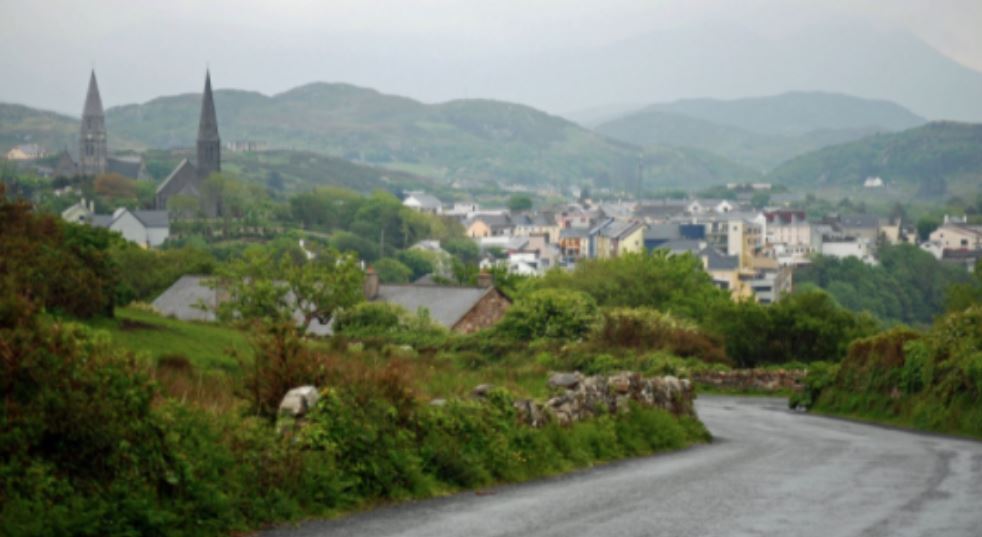Clifton, Ireland. Capital of Connemara

History was big this week. Yesterday, they carefully dismantled the statues down in Charlottesville of General Robert E. Lee and Stonewall Jackson. Those two were fairly big in Refuge Farm history, since General Lee started his campaign toward Gettysburg here, and just over at Cedar Mountain, Jackson got some of his reputation. The cast-metal statues of men on horseback will apparently be stored someplace, not destroyed outright, but who knows. That isn’t the point. The stone bases remaining presumably can be simply knocked down.
But that isn’t the point, either. What they represent is what is being destroyed. It is another of those events of the post-modern era. History was swirling this week. For a variety of perfectly good reasons, I was pouring through Mom’s genealogical research on her family. There is some amazing stuff in the pile of papers and it reflects some tough work by her slim but strong fingers in 1963. It was done before word processing, and the paper-copy I scanned years ago is not transferrable by any means except visual recognition and physical re-typing of it. I do know that she considered it information gleaned by commercial labor in a time before our internet connection to flawed but impressive universal knowledge.
There is some obvious balderdash contained in Mom’s accounts that date back to the 19th century. Clifden is the town in Ireland her family lived before fleeing. It is located in the region of Connemara, located on the Owenglin River where it flows into Clifden Bay. As the largest town in the region, it is often referred to as “the Capital of Connemara,” which would be more impressive if anyone knew where that region was. It would have been worth a visit, had I had been thinking of family and not some global conflict when I passed through London a bit in the 1990s. But sadly did not.
Mom’s work nearIy sixty years ago is still remembered. I found a paragraph she typed out in what was the laundry room of the little house at 688 Chester Street. She let me read it as part of my education as a twelve year old boy. She typed it out so she could share it, and so it is my turn to inflict it on you. The short paragraphs below capture how people who had just got through World War One felt about things that happened to their grandparents. With the tumult of racial grievance again swirling in our lives, I have seen a couple references to the Irish and their arrival in North America. In those, I have seen a couple references to the relative importance of things. One of them was the assertion that for hazardous jobs, slaveowners preferred to use Irish laborers, rather than their human possessions. The reason was that their possessions had market value, while the Irish did not.
Our home town back there was a place called Clifden. We left in 1848 for reasons that are apparent. According to Mom’s research, Clifden “is a town of surprising importance to find in such an out-of-the-way position by the Western Sea coast. It has a fine situation, substantial buildings and wide streets. The walks that can be made from this Center are outstanding, and it was (author William Makepeace) Thackery who described the surrounding country as the “most beautiful District that it is ever the fortune of a traveler to examine.”
With the beauty there was horror. The account lurches abruptly from pastoral beauty to common brutality:
“Yet there has been a tragedy here, for in 1847, when the great famine was at its height, one hundred and sixty corpses were picked off the roads. There is in the County Library a fine set of old and modern maps, and of Irish historical records, both continually being enlarged. In the cellars are all the minute books of the Boards of Guardians of County Galway. In one of the minute books there is an entry dated November, 1848, the time of the Irish Famine, and relates to the workhouse at Clifden:”
“There died this day at the Gates 240 souls.”
“The names of the individuals, men, women and children, are given. These men, women and children died for the liberty of their small nation no less than those who fell in the Great War, but more miserably. In the whirlwind of time, freedom sprang from their bones. From the descendants of those huge throng of Irish exiles that flocked to America to escape the same fate arose the influence that far more than the armed struggle, was the means of Irish Freedom.”
+++++++++++++++++++++++++++++++++++++++++++++++++++++++++++++++++++++++++++
I liked the declarative line of punctuation marks, and can almost remember what they sounded like as she pounded them out on a new electronic typewriter onto presentable paper backed by a carbon sheet and foolscap. What I don’t know is the sentiment in the last part. Mom cared about it, but it seems similar to the feeling of families who emigrated from places like Italy, and the statues they are tearing down now of Columbus. He was a fellow they felt helped define their role in building this country in North America. I have been to some of those Italian towns, and they are as lovely as the one Thackery described in Clifden. But none of that is important. We need to rip it all down so our kids can learn something else. Something different.

This is a picture of Grandpa, our line’s last 100% Irishman. I don’t know what he would say about the controversy- the people described were his grandparents. He was a Doughboy and a train Engineer. I suspect he might have been willing to start a conversation.
Copyright 2021 Vic Socotra
www.vicsocotra.com
